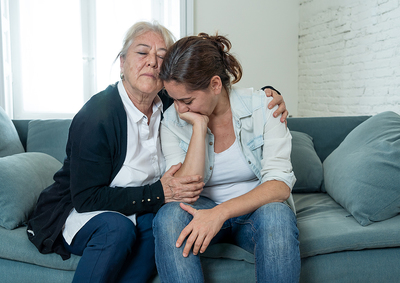
Family support can help with suicidality.
Highlights:
- Some LGBTQ people with internalized homophobia have negative feelings about their sexuality.
- Internalized homophobia can lead to suicidality in older populations in cultures that are less accepting of LGBTQ people.
- Suicidality because of internalized homophobia is something that substance abuse treatment professionals need to take into account when treating LGBTQ individuals.
What Is Internalized Homophobia?
Definition: Internalized homophobia is “the personal acceptance and endorsement of sexual stigma as part of the individual’s value system and self-concept.”
In other words, it is shame or negative feelings about one’s homosexuality.
Scientists who have studied internalized homophobia wondered if the negative feelings led to increased suicidality among the LGBTQ population. Research — like this study done in South Korea — shows that there can be an increase for older adults in cultures with high levels of social stigma.
This could be because younger people in general are more accepting of LGBTQ people and lifestyles and are also better at forming peer groups where acceptance is the norm. But not all young people are immune from suicidality related to internalized homophobia.
Suicidality and Depression
Suicidality is also associated with depression in the LGBTQ population; in other words, people of all ages who are already depressed are more likely to have suicidal thoughts or attempt suicide. LGBTQ persons are also more likely to be suicidal around the time they come out to family members or friends if they have feelings of internalized homophobia.
However, suicidality can be a factor for anyone in treatment for substance abuse. People who misuse substances are more likely to die from suicide because of the disinhibition that occurs with substance use. Substance abuse makes a person 10 times more likely to commit suicide than the general population, according to SAMHSA.
The most common age range for suicide is 45-54, but suicide is also a leading cause of death among those in younger age groups because most other causes of death are low.

Substance abuse treatment can bring up negative feelings.
Suicidality in LGBTQ
The course of treatment often brings up negative feelings and situations that contributed to the unhealthy substance use, and these feelings can lead to suicidality if they are not handled with sensitivity and care.
Treatment techniques that can help with suicidality in LGBTQ populations include:
- life skills training
- problem-solving skills development
- emotional regulation skills
- nurturing healthy family relationships and friendships
- cultivating strong school and community ties
Parents and caregivers can also be trained in safety practices for homes where those with suicidality reside, including how to safely dispose of drugs and alcohol when they are found and when to get medical attention for those in the home.
Families who show love and acceptance to LGBTQ individuals can decrease the chances of suicidality at any age, no matter what the culture or even the family’s beliefs about these alternative lifestyles happen to be. Many cultures now exist that have removed the stigma from LGBTQ behaviors and lifestyles, and helping people to find and access these areas of belonging within the wider culture can be a part of effective treatment when depression and suicidality are factors in substance abuse.
Harris House is a safe place for LGBTQ individuals to find help and treatment for their substance abuse issues and all of the root causes that go along with them. Call us to learn about admissions to our top-rated inpatient programs as well as outpatient and other support programs.







